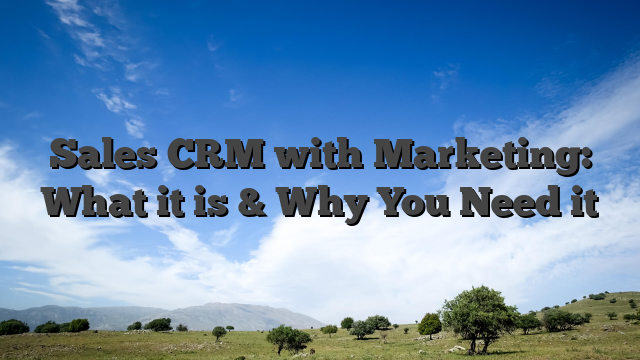In today’s competitive landscape, aligning sales and marketing efforts is key to a thriving business. Sales CRM with marketing integration stands at the forefront of this synergy, blending customer relationship management (CRM) with marketing strategies for unparalleled efficiency.
- Defining Sales CRM and Marketing Integration
Sales CRM, a powerful tool for managing customer relationships, gets a boost when integrated with marketing efforts. This fusion aims to align sales and marketing functions, ensuring a cohesive approach toward customer acquisition, engagement, and retention.
- Importance of Unified Sales and Marketing Efforts
The collaboration between sales and marketing amplifies business success. A united front allows for consistent messaging, better targeting, and a more profound understanding of customer needs, leading to increased conversions and revenue growth.
This blog aims to delve into the realm of Sales CRM with Marketing, exploring its definition, benefits, implementation strategies, and real-world applications, emphasizing its crucial role in modern business operations.
What You Get with a Fully Aligned Sales and Marketing Team
A harmoniously aligned sales and marketing team represents a powerhouse within any organization, capable of delivering multifaceted advantages that significantly impact business growth and success.
1. Consistent and Unified Messaging
A unified front between sales and marketing ensures consistency in messaging across all customer touchpoints. Aligning strategies and objectives allows for a seamless transition of brand messaging from marketing campaigns to sales interactions, reinforcing brand identity and clarity.
2. Enhanced Customer Understanding and Engagement
When sales and marketing teams work in tandem, a deeper understanding of customer behavior and preferences emerges. This synergy enables the creation of tailored content and personalized approaches, leading to increased customer engagement and improved conversion rates.
3. Streamlined Processes and Efficient Workflows
The alignment between sales and marketing teams streamlines workflows, eliminating redundancies and fostering efficiency. Clear communication and shared goals lead to optimized processes, quicker lead handoffs, and a more efficient sales funnel, ultimately maximizing productivity.
4. Improved Lead Quality and Nurturing
A unified approach ensures better lead qualification and nurturing strategies. Marketing efforts provide sales teams with higher-quality leads, and the sales team feedback loop enriches marketing strategies, resulting in more effectively nurtured leads and higher conversion rates.
5. Aligned Goals Driving Growth
Alignment of sales and marketing goals instills a shared vision, fostering a culture of collaboration and mutual support. This alignment propels the entire organization toward achieving overarching growth objectives, ultimately driving revenue and business success.
6. Data-Driven Decision Making
Collaboration between sales and marketing teams enables the collection and sharing of valuable customer data. This shared data pool facilitates data-driven decision-making, allowing both teams to make informed strategic choices, refine approaches, and adapt swiftly to market changes.
7. Enhanced Company Culture and Morale
A unified team fosters a positive company culture. Collaborative efforts and shared achievements create a sense of unity, boosting morale and encouraging cross-departmental cooperation, leading to a more vibrant and productive work environment.
In essence, a fully aligned sales and marketing team represents a catalyst for holistic business growth, driving innovation, efficiency, and customer-centricity at every turn.
What is Marketing Automation?
Marketing automation within CRM system revolutionizes the way businesses engage with their audience, allowing for efficient and targeted marketing strategies. This innovative approach leverages technology to automate repetitive marketing tasks, streamline workflows, and nurture leads through personalized interactions.
- Automated Lead Management and Nurturing
- Personalized and Targeted Campaigns
- Automated Workflows and Task Management
- Data-Driven Insights and Reporting
- Improved Efficiency and Scalability
- Integration with Sales Efforts
Understanding Sales CRM and Marketing Integration
- Explaining Sales Customer Relationship Management (CRM)
At its core, CRM revolves around managing interactions and relationships with potential and existing customers. It tracks customer interactions, streamlines processes, and fosters customer retention, serving as a centralized hub for vital customer data.
- Defining Marketing Integration within CRM Systems
Marketing integration within CRM involves merging marketing strategies seamlessly into the CRM platform. This integration enables businesses to leverage customer data to refine marketing campaigns, personalize communications, and improve overall marketing effectiveness.
- Benefits of Merging Sales CRM with Marketing Strategies
The amalgamation of sales CRM with marketing strategies yields multifaceted advantages, including enhanced customer insights, refined targeting, streamlined workflows, and improved collaboration between sales and marketing teams.
The Role of Unified Sales CRM and Marketing
Seamless Customer Data Management
Integrating sales CRM with marketing ensures a unified database, offering a holistic view of customer interactions and preferences. This consolidated data fuels targeted marketing campaigns and informed sales strategies.
Enhanced Lead Generation and Nurturing
Aligning sales CRM with marketing facilitates efficient lead generation and nurturing. Marketing insights aid in identifying and prioritizing leads, while sales CRM enables personalized engagement, fostering stronger relationships with prospects.
Optimized Sales Funnel and Customer Journey
A synchronized approach between sales CRM and marketing refines the sales funnel, guiding customers seamlessly through each stage of their journey. This alignment ensures a cohesive experience, from initial engagement to conversion.
Advantages of Sales CRM and Marketing Collaboration
Improved Customer Insights and Personalization
Combining sales CRM with marketing strategies grants deeper insights into customer behaviors and preferences, enabling personalized interactions and tailored offerings, enhancing customer satisfaction.
Alignment of Sales and Marketing Objectives
The integration aligns the goals of sales and marketing teams, fostering better communication, shared objectives, and a unified focus on nurturing leads and closing deals.
Higher Conversion Rates and Revenue Generation
A harmonious collaboration between sales CRM and marketing leads to more qualified leads, reduced sales cycles, and increased conversion rates, ultimately boosting revenue generation and business growth.
Implementing Sales CRM with Marketing Strategies
Selecting the Right CRM and Marketing Tools
When venturing into Sales CRM and marketing integration, choosing the appropriate tools is critical. Look for platforms that seamlessly integrate CRM and marketing functionalities. Ensure the selected tools align with your business goals, scalability, and user-friendliness.
Integration Techniques and Best Practices
Successful integration demands a clear roadmap. Utilize standardized integration techniques that sync CRM data with marketing platforms effectively. Emphasize data consistency, regular synchronization, and a collaborative approach between sales and marketing teams for optimal outcomes.
Training and Collaboration between Sales and Marketing Teams
Implementing Sales CRM with marketing necessitates comprehensive training and collaboration. Equip teams with the necessary skills to maximize tool utilization. Foster open communication channels between sales and marketing to facilitate shared insights and aligned strategies.
Read More – Customer relationship management system
Real-Life Examples and Success Stories
Case Studies Demonstrating Effective Sales CRM and Marketing Integration
Explore case studies showcasing businesses successfully integrating Sales CRM with marketing. Witness firsthand how this fusion enhanced customer engagement, boosted conversions, and drove revenue growth.
Showcasing Tangible Results and Positive Impacts
Real-life success stories highlight tangible results. From streamlined processes to improved customer experiences, these instances demonstrate the transformative power of Sales CRM with marketing integration.
Lessons Learned and Key Takeaways from Successful Implementations
Extract key lessons and takeaways from successful implementations. Learn from challenges faced, innovative solutions applied, and the pivotal factors contributing to their success.
Conclusion
Elevate your business by harnessing the potential of Sales CRM solutions Singapore with marketing integration. The seamless alignment between sales and marketing functions empowers businesses to deepen customer relationships, streamline operations, and drive sustainable growth.




